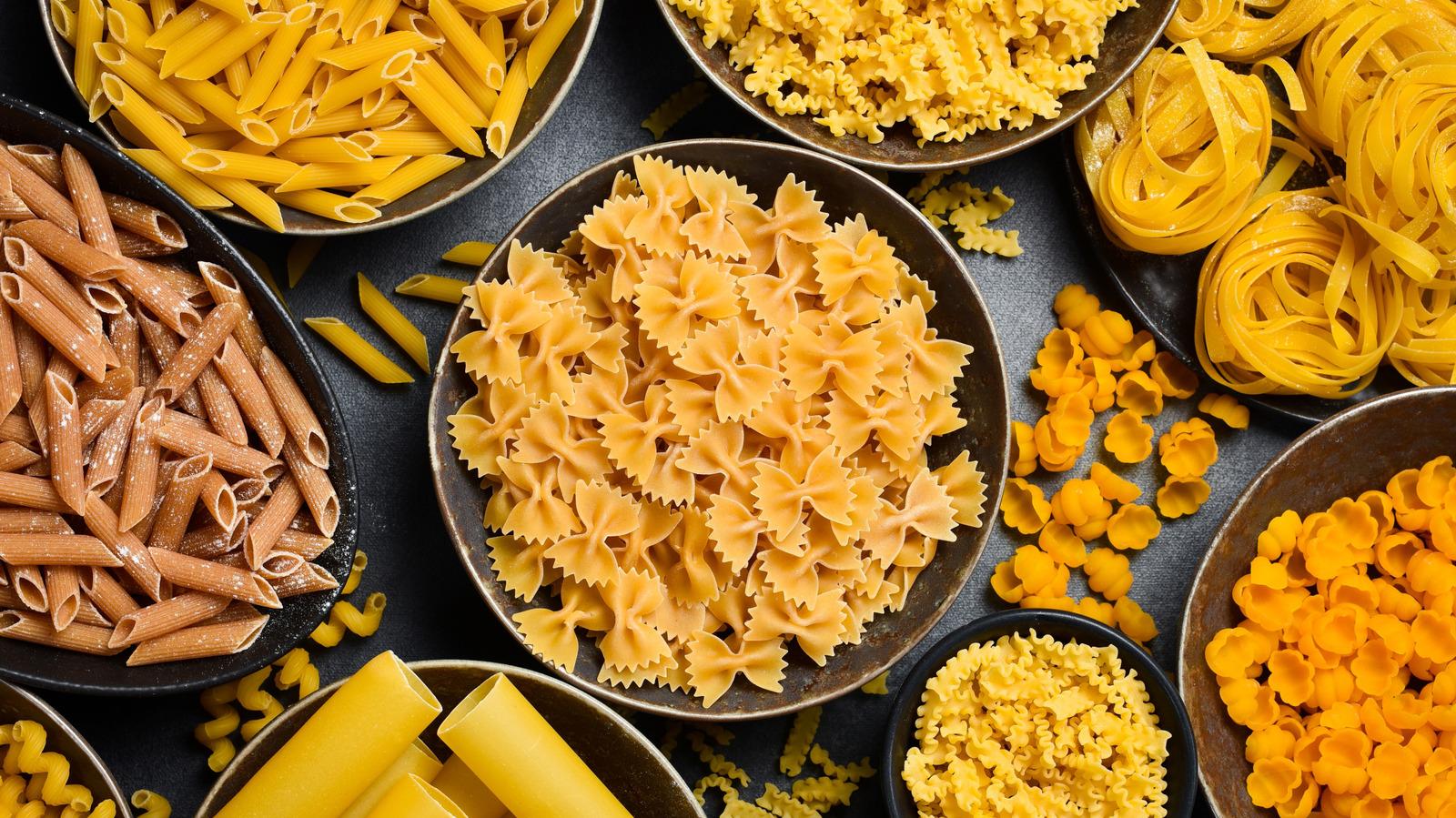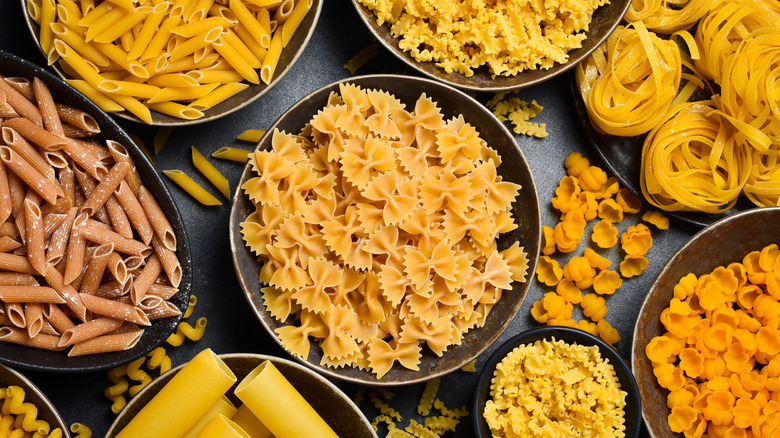
YARUNIV Studio/Shutterstock
Noodles made from scratch can't be beaten, but not all of us have time to tackle a homemade pasta recipe on an average weekday. Normally, most folks want to pick something up from the store, toss it in boiling water for 10 minutes, and call it a day. So, we asked Italian chefs for the best store-bought pasta brand. The fact is, not all pasta is equal, so it's worth looking out for the best varieties.
The best pasta cooks evenly and holds on to sauce well. It should have a slightly firm texture with a little bite to it. And, while you might think of pasta just as a vehicle for sauce, it should have a good flavor, too. Lesser brands can end up limp or slimy. They might cook unevenly, so some parts are mushy while others are undercooked. So, even if you think all noodles are basically the same, there are some notable differences.
I spoke to four chefs from Italian restaurants who told me their favorite brands of store-bought pasta. They covered everything from everyday favorites that you can pick up at the average grocery store to fresh pasta splurges that you might have to go to a specialty store to find. And, as a half-Italian food writer, I have strong opinions about it, too. Here are the seven best pasta brands, as chosen by Italian chefs, so you know what to pick up next time you head to the store.
Garofalo
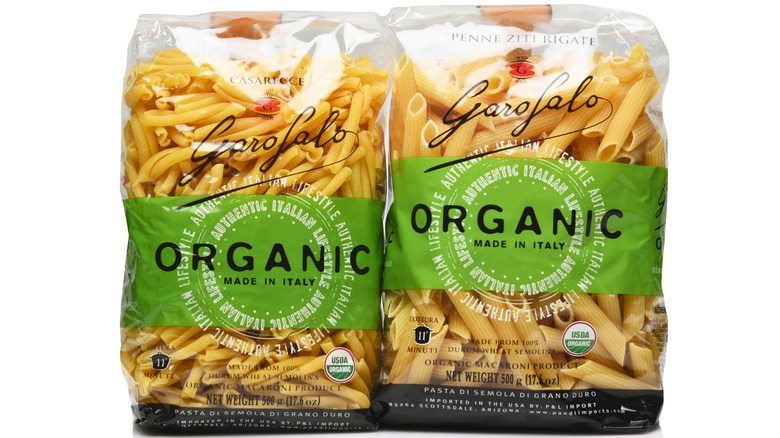
Steve Cukrov/Shutterstock
You might have seen Garofalo pasta in Costco or in specialty stores and wondered whether it's worth picking up. Well, the short answer is "Yes." This Italian pasta brand is serious about crafting the best noodles it can. It considers factors like ingredient quality, gluten content, and thickness to achieve the ideal results.
"Garofalo, made near Naples, Italy, is crafted with high-quality durum wheat semolina that gives the pasta a firm texture and rich flavor," says Angelo Caruso, owner and chef of Angelo's Ristorante in Stoneham, MA. He talks about how the slightly rough texture of the pasta holds the sauce better and that it cooks to al dente easily, holding its shape well, rather than getting mushy or falling apart. It's one of my go-to pasta choices. I love the texture and flavor, as well as the wide range of pasta shapes, some not readily available from other brands.
Garofalo only uses first-class semolina, choosing Desert Durum from Arizona plus select Australian and Italian grains. It avoids pre-harvest treatments and picks wheat for protein, color, and flavor. The company looks at both the gluten content and the quality of the gluten, because it governs firmness, resilience, and how the pasta keeps its shape even if slightly overcooked. Plus, the dough is mixed with relatively cool water, which plays a part in helping the pasta bind to sauce and preserving the grain's natural color. All these factors add up to exceptional pasta.
Barilla
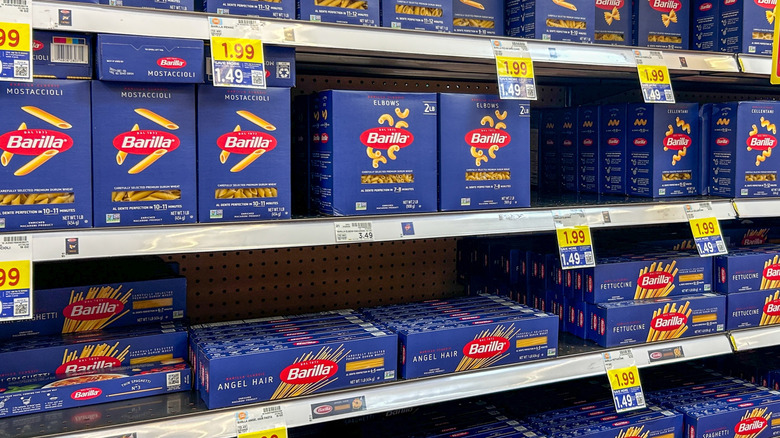
PassingMoments/Shutterstock
Two of our chefs chose Barilla as a favorite, particularly as an affordable everyday choice. You can buy it in practically any grocery store, making it a great option if you don't have time to go to a specialty store or drive around a few locations to find something more obscure.
It's a favorite of Steve Chiappetti, executive chef at Chicago Italian restaurant The Albert, who named it his most trusted dry pasta. "It's consistent, it cooks the way it should every time, and the quality of the flour allows it to hold up to any sauce you throw at it," he says. Chiappetti also appreciates that Barilla has put effort into making high-protein, whole-grain, and nutrient-enriched pastas, making them suitable for a range of diets.
Matt Harding, Chief Innovation Officer at Piada Italian Street Food, is also a Barilla fan. He notes that it's made for uniform cooking, so it should cook evenly and be consistent every time. "Whether you're using different pots, water types, or cooks, it reliably hits that al dente mark," he tells us, noting that "its texture holds up even if slightly overcooked, reducing the risk of mushiness."
Harding also appreciates the neutral flavor that lets the sauce and other ingredients be the star. The Al Bronzo or Protein+ lines "are especially good for elevated texture and flavor," he adds. Barilla's gluten-free pasta is also a boon for those who can't eat wheat. So, if you're looking for a reliable pasta you can pick up almost anywhere, Barilla is the way to go.
De Cecco
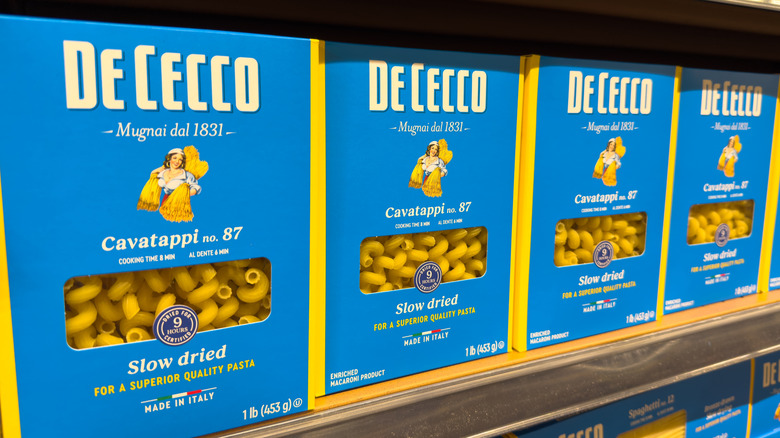
ZikG/Shutterstock
De Cecco pasta is a favorite of both Angelo Caruso and Steven Jerome of Refined Restaurant Group and its Sorellina Cucina Italiana located in Las Vegas, NV. It's a store-bought option that you can rely on, giving you excellent texture and cooking beautifully every time. It's also one of my pasta brands of choice. I love how evenly it cooks while retaining its shape.
"De Cecco is the standout when it comes to store-bought pasta," says Steven Jerome. "The pasta has the right density and bite, and the bronze-die process gives it that perfect texture to hold onto sauce." He notes that the brand's bucatini and rigatoni are particularly good examples of what it does well.
Angelo Caruso appreciated De Cecco for its "consistent quality." He says it's one of the pastas that can help "you get that restaurant-quality result at home every time." He notes the consistency of cooking and the bronze-die extrusion — a process that gives noodles a rougher texture so they hold sauce better.
Fairly widely available, it shouldn't be too much of an issue to get hold of De Cecco pasta. Maybe it's not in every grocery store, but most larger chains stock it. So, it's easy to find and great quality, meaning it should definitely be on your noodle short list.
Rummo
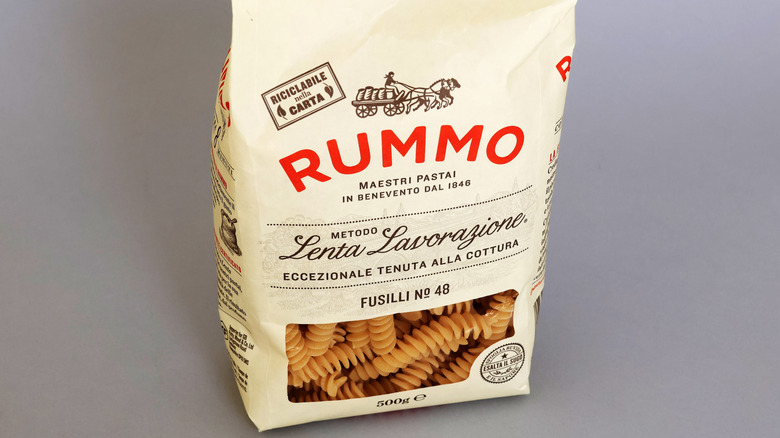
Walter Cicchetti/Shutterstock
Matt Harding of Piada Italian Street Food recommends Rummo, an Italian brand that's been around for 175 years. "Rummo sets itself apart with traditional bronze dyes that create a rough, porous surface perfect for catching sauce—bringing it closer to fresh, handmade pasta than most supermarket brands," he tells us.
"Its slow-drying process preserves the gluten network, so it stays perfectly al dente even if slightly overcooked," Harding adds. He also notes that, because it's made from high-quality durum wheat semolina, it has a slightly nutty and subtly sweet flavor that helps it take simple dishes like cacio e pepe to the next level. "It's pasta with real depth and character," says Harding.
Rummo constantly searches for the best wheat and treats raw materials seriously, believing that consistency starts at the grain. Water and wheat are worked together slowly to build an elastic dough rather than forcing it with speed, which helps get the texture right. Plus, drying times and temperatures are adjusted for each pasta shape so moisture leaves at the right rate, preserving the texture and flavor. A lot of care and attention goes into this pasta, making it a worthwhile choice (and one of my personal go-tos as well).
Giovanni Rana
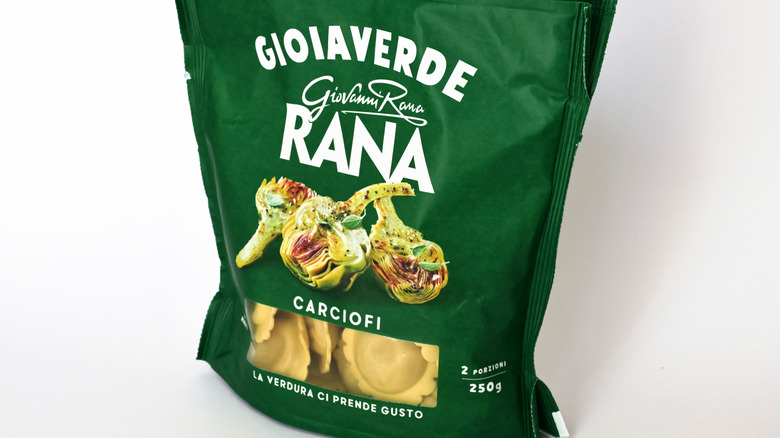
Walter Cicchetti/Shutterstock
Just because you're in the market for store-bought pasta, it doesn't have to be dry. There are plenty of store-bought fresh pastas you can pick up. Sure, it might not be a pantry staple, but if you're looking for something softer and silkier compared to the bite of dried pasta, fresh might be the way to go. And, if you ask Steve Chiappetti of The Albert, Giovanni Rana is the best option out there, getting you "closer to the flavor and feel of homemade pasta without actually making it yourself."
"The dough has that fresh, tender bite, and the fillings in their ravioli and tortellini taste real, Chiappetti tells us. "It's the brand I recommend when you want a quick weeknight dinner that still feels special." It's fairly easy to pick up in supermarkets, so you don't have to go out of your way to find something that approaches fresh pasta. You can buy stuffed pastas or a handful of standard pasta shapes, such as penne and tagliatelle — one of the best pasta shapes to pair with richer sauces.
Rustichella d'Abruzzo
You won't find Rustichella d'Abruzzo everywhere, but if you find it in a specialty grocer, pick up a pack. This high-end pasta is still made by the same family that started the brand in 1924. Its carefully chosen ingredients and attention to detail in the way it's produced mean that it's one of the favorite choices of Matt Harding.
"Made by small, heritage-driven producers in Abruzzo, this pasta focuses on craftsmanship over scale," Harding says, noting that the manufacturer specializes in regional varieties. It's notably made from local wheat, which adds to the flavor and the integrity of the protein. "The high-protein semolina yields a springy texture with an al dente bite that never goes mushy," he raves.
Harding also loves that it doesn't just have a neutral flavor, like most pastas, which can end up tasting boring. Instead, "Rustichella highlights the grain itself — a nutty, terroir-driven flavor that makes the pasta a star, not just a vessel." He also appreciates the textured surface from the bronze die, which helps the sauce cling to the noodles.
Best gluten-free pasta: Jovial
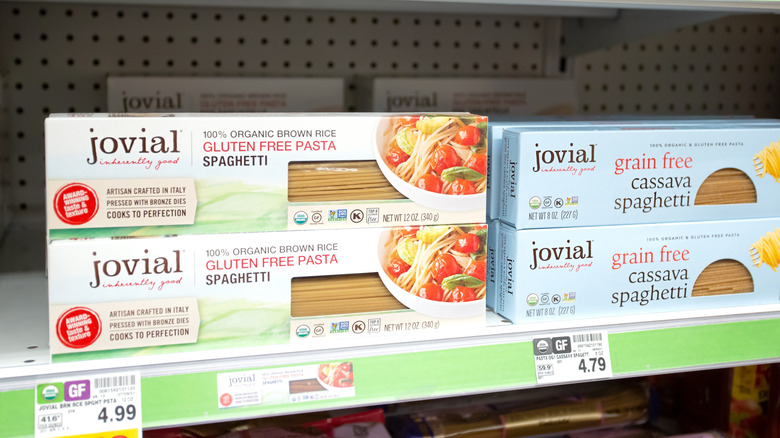
The Image Party/Shutterstock
If you're looking for decent gluten-free pasta, you might be feeling stumped. Like a lot of gluten-free alternatives, pasta made without wheat can be hit-or-miss — but more often miss. Gluten is integral to that firm, springy texture that good pasta has, and gluten-free versions can miss the mark. But chef Steve Chiappetti has a solution.
"Gluten-free pasta has come a long way, and Jovial is one of the best I've tasted," Chiappetti tells us. "Made with brown rice, it cooks up with great texture — not mushy — and actually tastes like pasta," he says. Texture can be one of the places that gluten-free pasta falls down, but flavor can be an issue, too. And Jovial delivers on both. Chiappetti recommends it for anyone who needs to avoid gluten, so you can keep pasta night going, even without the wheat. This is an excellent gluten-free choice, but we'd still recommend buying regular pasta unless you're celiac or have an allergy or intolerance.



